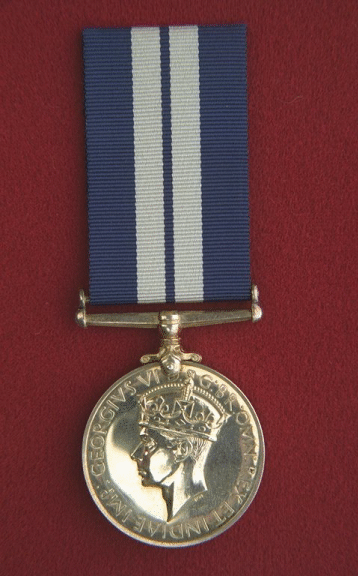Context
The medal was instituted on 14 October 1914.
Eligibility and Criteria
The medal is awarded to Chief Petty Officers, Petty Officers and non-commissioned members of the Navy (or Army and Air Force personnel of equal rank serving with the fleet) who show themselves to the fore in action, and set an example of bravery and resource under fire, but without performing acts of such pre-eminent bravery as would render them eligible to receive the Conspicuous Gallantry Medal.
Description
A circular, silver medal, 1.42 inches in diameter. For mounting, straight suspender is fastened to the medal with a single-toe claw.
Medal obverse:
King George VI: A crowned effigy, facing left, and one of the legends:
1. GEORGIVS VI D: G: BR: OMN: REX ET INDIAE IMP: (for the Second World War)
2. GEORGIVS VI DEI GRA: BRITT: OMN: REX FID: DEF: *(for the Korean War)
Queen Elizabeth II: A crowned effigy, facing right, and the legend:
ELIZABETH II D: G: BR: OMN: REGINA R: D: (for Korea)
The reverse shows the legend FOR/DISTINGUISHED/SERVICE in three lines, encircled by a laurel wreath and surmounted by an Imperial Crown.
The ribbon is 1.25 inches wide and consists of three equal stripes: dark blue, white, and dark blue, with a thin dark blue stripe down the centre of the white.
Bars
The silver, laurelled bar is awarded for additional acts of bravery.
Historical Notes
- The edge of the medal was impressed until 1944, and thereafter engraved with the service number, rank, initials, surname and service of the recipient.
- Issued medals:
- Total to Canadians: 116 to Royal Canadian Navy (RCN) plus two first bars.
- First World War: No awards to Canadians.
- Second World War: 114 to RCN, plus two first bars (George VI medals).
- Korean War: two to RCN (EIIR medals).
